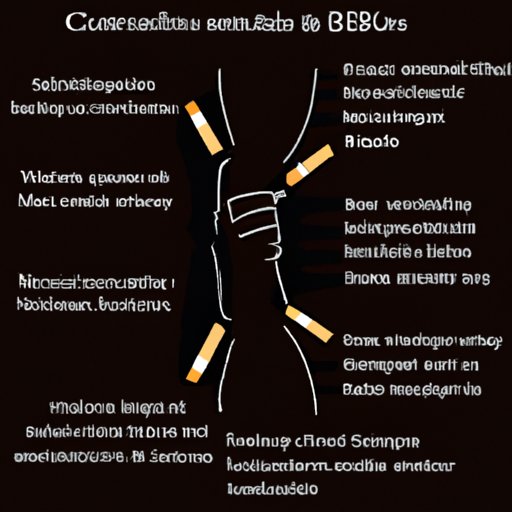Introduction
Cigars are a type of tobacco product made from rolled leaves of tobacco. Unlike cigarettes, they are wrapped in a tobacco leaf or a material that contains tobacco. People who smoke cigars may inhale the smoke, or simply hold it in their mouths to enjoy the flavor.
Cigars have been linked to several serious health risks, including lung cancer, heart disease, and stroke. In this article, we’ll discuss the potential health effects, nicotine content, secondhand smoke risks, flavored cigar risks, and financial costs associated with cigar smoking.

Health Effects of Smoking Cigars
Smoking cigars has been linked to a number of serious health risks. According to the American Cancer Society, cigar smoking increases the risk of several types of cancer, including lung cancer, laryngeal cancer, and oral cancer. The risk is higher for people who inhale cigar smoke.
Cigar smoking has also been linked to an increased risk of heart disease. A study published in the journal Circulation found that cigar smokers had a 50% higher risk of coronary heart disease than non-smokers. The risk was even higher for people who smoked both cigars and cigarettes.
In addition, cigar smoking has been linked to an increased risk of stroke. A study published in the journal Stroke found that cigar smokers had a 64% higher risk of ischemic stroke than non-smokers.
Nicotine Content in Cigar Smoke
Cigar smoke contains nicotine, which is a highly addictive substance. The amount of nicotine in cigar smoke is higher than the amount in cigarette smoke. According to a study published in the journal Nicotine & Tobacco Research, a single cigar can contain up to 100 mg of nicotine, compared to 8 to 20 mg in a cigarette.
This means that cigar smokers are exposed to higher levels of nicotine than cigarette smokers, making them more likely to become addicted. In addition, cigar smokers may be more likely to develop nicotine dependence and withdrawal symptoms when they try to quit.
Secondhand Cigar Smoke
Secondhand cigar smoke can also be dangerous. According to the Centers for Disease Control and Prevention (CDC), breathing secondhand cigar smoke can increase a person’s risk of developing lung cancer, heart disease, and other health problems.
Flavored Cigars
Cigars come in a variety of flavors, such as cherry, chocolate, and vanilla. These flavored cigars may seem harmless, but they can actually be more dangerous than regular cigars. This is because they often contain chemicals that can damage the lungs and increase the risk of cancer.
Financial Costs
In addition to the health risks, smoking cigars can also be expensive. Cigar smokers may have to pay higher insurance premiums than non-smokers, as well as increased healthcare costs due to the health risks associated with smoking.
Quitting Smoking Cigars
If you’re a cigar smoker, there are resources available to help you quit. The CDC offers a variety of quitting resources, including online tools, phone counseling, and support groups.
Types of Cigars
There are many different types of cigars, including small cigars, cigarillos, and large cigars. While all types of cigars are associated with health risks, small cigars and cigarillos usually have higher concentrations of nicotine and other toxins than large cigars.
Conclusion
In summary, cigar smoking can be just as harmful to your health as smoking cigarettes. It increases the risk of lung cancer, heart disease, and stroke, and it can be more addictive due to the higher levels of nicotine. In addition, flavored cigars can be even more dangerous due to the chemicals they contain. Finally, cigar smoking can be financially costly, due to higher insurance premiums and increased healthcare costs. If you’re a cigar smoker, there are resources available to help you quit.
(Note: Is this article not meeting your expectations? Do you have knowledge or insights to share? Unlock new opportunities and expand your reach by joining our authors team. Click Registration to join us and share your expertise with our readers.)
